

Technology: Myth of Multitasking. Like many wired people, you probably take great pride in being a multitasker.
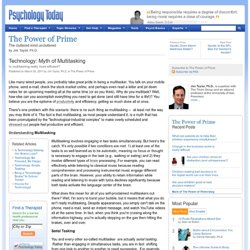
You talk on your mobile phone, send e-mail, check the stock market online, and perhaps even read a letter and jot down notes for an upcoming meeting all at the same time (or so you think). Multitasking Muddles Brains, Even When the Computer Is Off. Some people suspect that a multitasking lifestyle has changed how they think, leaving them easily distracted and unable to concentrate even when separated from computers and phones.
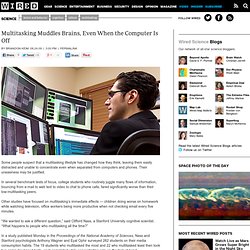
Their uneasiness may be justified. In several benchmark tests of focus, college students who routinely juggle many flows of information, bouncing from e-mail to web text to video to chat to phone calls, fared significantly worse than their low-multitasking peers. Other studies have focused on multitasking’s immediate effects — children doing worse on homework while watching television, office workers being more productive when not checking email every five minutes. Is Multitasking Actually a Myth? When you're a family caregiver, your list of to-dos probably feels endless: doctor appointments, meting out medications, prepping meals, shopping, scheduling home visits, not to mention caring for your own family, working, and, oh, trying to carve out a few minutes of peace and quiet... and that's just Monday.
In order to tackle the exhaustive list of responsibilities, many caregivers turn to multitasking to get it all done in the least amount of time. I define multitasking as conducting two (or more) unrelated activities at the same time -- lets say, doling out a prescription while talking on the phone with your child's teacher. "Did I just give you two or three pills, Mom? " You see where this is heading. Asking Questions to Improve Learning. When you prepare for class, office hours, and help sessions, compose specific questions that you will ask your students (or that you anticipate they will ask you).
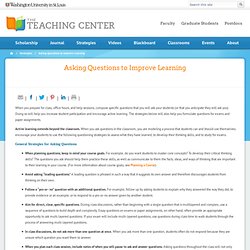
Doing so will help you increase student participation and encourage active learning. The strategies below will also help you formulate questions for exams and paper assignments. Active learning extends beyond the classroom. When you ask questions in the classroom, you are modeling a process that students can and should use themselves; encourage your students to use the following questioning strategies to assess what they have learned, to develop their thinking skills, and to study for exams. General Strategies for Asking Questions.
Sc0810_54.pdf. Educational Leadership:Creativity Now!:Asking Questions—At Four Different Levels. Robert J.
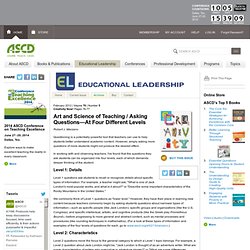
Marzano Questioning is a potentially powerful tool that teachers can use to help students better understand academic content. However, simply asking more questions of more students might not produce the desired effect. In working with and observing teachers, I've found that the questions they ask students can be organized into four levels, each of which demands deeper thinking of the student. Homemade Marble Run. Tobacco/pdf/activities.pdf. The Only Classroom Rules You’ll Ever Need. If you’re looking for elaborate or decorative classroom management ideas, you won’t find them here.
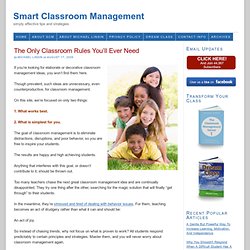
Though prevalent, such ideas are unnecessary, even counterproductive, for classroom management. On this site, we’re focused on only two things: 1. What works best. Team Zambezi parent behavior warning letter - Taking Center Stage-Act II (TCSII) (CA Dept of Education) Place on school letterhead.
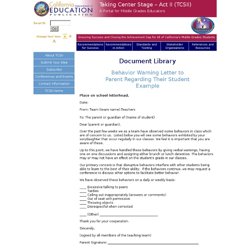
Date: From: Team (team name) Teachers To: The parent or guardian of (Name of student) Dear (parent or guardian), Over the past few weeks we as a team have observed some behaviors in class which are of concern to us. Listed below you will see some behaviors exhibited by your son/daughter that occur regularly in our classes. Up to this point, we have handled these behaviors by giving verbal warnings, having one on one discussions and assigning either brunch or lunch detention. Our primary concern is that disruptive behaviors interfere with other students being able to learn to the best of their ability. Why A Letter Home Is An Effective Consequence. As a third consequence of your classroom management plan , I recommend a letter home to parents. But probably not for the reasons you may think. I can’t emphasize enough that consequences for misbehavior are only a small part of classroom management.
By themselves, they cannot deter students from misbehaving. No set of consequences is strong enough on its own. Managing Feedback. (I'm going through the queue!
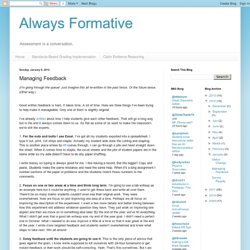
Just imagine this all re-written in the past tense. Or the future tense. Either way.) Good written feedback is hard. It takes time. Strategies to Improve Memory and Retention. GULP is an acronym for an effective four step process to improve short and long term memory.
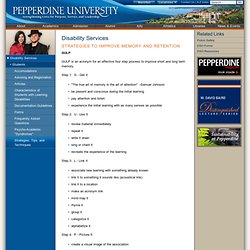
Step 1: G - Get It "The true art of memory is the art of attention" -Samuel Johnson be present and conscious during the initial learning pay attention and listen experience the initial learning with as many senses as possible. Www.lewiscenter.org/documents/AAE/Love and Logic/Parenting/LandLTips.pdf.
Seating Challenges. Classroom Management - Teaching and Learning 1to1. Visualization. Visualizing the Earth, its processes, and its evolution through time is a fundamental aspect of geoscience.
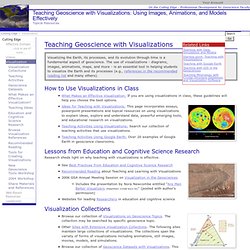
The use of visualizations - diagrams, images, animations, maps, and more - is an essential tool in helping students to visualize the Earth and its processes (e.g., references in the recommended reading list and many others). How to Use Visualizations in Class. Discipline Based Education Research (DBER) in the Earth Sciences. Contributions and Opportunities for the Geosciences DBER Book Cover Provenance: National Research Council Reuse: This item is offered under a Creative Commons Attribution-NonCommercial-ShareAlike license You may reuse this item for non-commercial purposes as long as you provide attribution and offer any derivative works under a similar license.
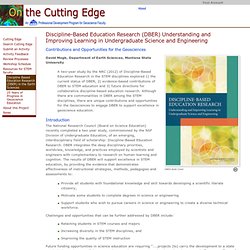
David Mogk, Department of Earth Sciences, Montana State University. Research on Learning in the Geosciences. Related Resources Earth and Mind: the Blog - This blog has been created with the goal of stirring up discussion of ideas, questions, discoveries and controversies related to how people think and learn about the Earth and environment. The blog is brought to you by the same researchers behind the Synthesis of Research on Thinking and Learning in the Geosciences project. Earth and Mind: How Geologists Think and Learn about the Earth Edited by Cathryn Manduca and David Mogk, this volume brings together essays by geoscientists, cognitive scientists, and educators that explore how expert geoscientists learn about the Earth and the implications for student learning.
Join the Discussion. 8th Grade Science Teaching Techniques - Force And Motion Lesson. Four Ways to Give Good Feedback. Research for Better Teaching - Map of Pedagogical Knowledge - Pyramid Explorer. Allington, R. L., and Johnston, P. "What Do We Know About Effective Fourth-Grade Teachers and Their Classrooms? " A Framework For Improving K-12 Science Education. Some have bemoaned the weaknesses in kindergarten – 12th grade (K-12) science education in the United States (US). They have said there is too much emphasis on memorizing facts (Quinn, 2012). The facts covered span wide areas in science and are so abundant that students only develop a shallow understanding of core ideas (Alberts, 2012a; Alberts, 2012b).
Switch: Don't Solve Problems. Kids Get Hands-On With Science In A 'Dream Garage' Hide captionCommunity Science Workshops give low-income kids around California opportunities to learn about science firsthand — from holding spiders to building robots. What's The Big Idea? Pentagon Agency Backs Student Tinkerers To Find Out : All Tech Considered. Learning About Teaching Physics. Teaching index. Why Nate Silver Can Save Math Education in America.